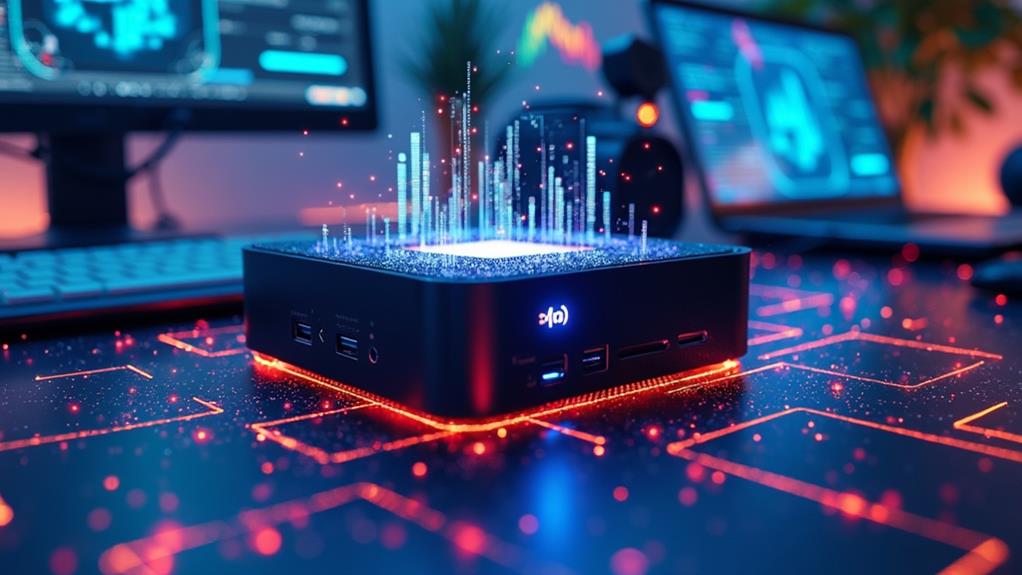



When it comes to selecting the ideal mini PC for your home automation voice control system, a few key features should be at the top of your list. You'll want a device that packs a punch with a powerful processor, ample RAM for smooth operations, and high-speed storage to keep your setup running efficiently. But that's not all – reliable network connectivity, efficient power consumption, and versatility in connectivity options are also pivotal for seamless automation. With so many mini PCs on the market, how do you know which one will deliver the paramount performance you need?
Key Takeaways
- Mini PCs with Intel Core or AMD Ryzen processors handle multiple voice control integrations efficiently.
- At least 4GB RAM with upgrade options to 8GB or 16GB ensures seamless multitasking.
- High-speed SSDs or M.2 NVMe storage support quick boot times and responsive system performance.
- Robust network connectivity, including Gigabit Ethernet and Wi-Fi 6, supports reliable smart home integrations.
- Balance between processing power and low power consumption ensures continuous operation while keeping energy bills in check.
Criteria for Choosing Mini PCs
To optimize your home automation voice control system, choosing the right mini PC involves several key criteria. When selecting a mini PC for Home Assistant, you should focus on processor performance, RAM capacity, storage options, network connectivity, and power efficiency. This guarantees your smart home setup operates smoothly and can handle multiple integrations simultaneously.
Mini PCs with Intel Core or AMD Ryzen processors provide the necessary processing power to handle the demands of running a home automation platform and multiple voice control integrations. A minimum of 4GB RAM is recommended, with the ability to upgrade to 8GB or 16GB for seamless multitasking and running multiple smart home applications simultaneously.
Robust network connectivity, including Gigabit Ethernet and Wi-Fi 6 support, is also essential for reliable smart home integrations and cloud-based voice control services. High-speed solid-state drives (SSD) or M.2 NVMe storage options guarantee quick boot times and responsive system performance for home automation tasks. By choosing a mini PC that meets these criteria, you can guarantee a robust and reliable home automation voice control system.
Top Mini PCs for Home Automation
In your quest for efficient home automation, you can confidently rely on these excellent mini PCs to power your voice control system, ensuring
Power Efficiency and Performance
When it comes to driving your home automation voice control system, the key to efficient operation lies in the balance between powerful processing and low power consumption within your mini PC selection. To guarantee seamless integration with various smart devices and peripherals, a mini PC must be capable of handling significant workloads while minimizing energy consumption.
Mini PCs equipped with multi-core processors and sufficient RAM, such as the Intel Core i3 or AMD Ryzen, provide the necessary processing power to handle voice commands and other tasks demanded by a Home Assistant setup. These modern processors are designed with energy efficiency in mind, ensuring that your system remains operational 24/7 without excessive heat or energy consumption.
Compact and low-power devices like the Intel NUC or Raspberry Pi offer a balance between processing power and energy efficiency. Effective thermal management is pivotal in these mini PCs to maintain ideal performance during intensive voice control tasks without excessive power consumption. By carefully selecting a mini PC that balances power consumption and processing capability, you can guarantee smooth voice command responses and continuous operation while keeping your energy bills in check.
Storage and Connectivity Options
Compact, high-performance storage options and versatile connectivity solutions are essential for ensuring reliable voice command responses and seamless integration within your home automation setup, where devices like the OWEPAS NAS Mini PC WTR Pro offer robust storage expandability and multiple USB ports for peripherals.
When it comes to storage capacity, mini PCs often feature high-capacity solid-state drives (SSDs) or fast M.2 NVMe storage, providing reliable and responsive performance. These compact form factors allow for discreet placement in your smart home environment while maintaining low power consumption.
The connectivity options on mini PCs are extensive, including USB ports (often USB 3.0 for high-speed data transfer), HDMI outputs, Ethernet, Wi-Fi, and Bluetooth. This range of connectivity solutions facilitates smooth integration with various smart home devices, peripherals, and systems, including Z-Wave or Zigbee adapters.
Mini PCs with Intel processors, such as those found in the Intel NUC series, offer notable processing power while maintaining energy efficiency, making them well-suited for continuous 24/7 operation in home automation setups. This exceptional combination of performance, compact form factor, and low power consumption makes mini PCs an ideal choice for running home automation voice control systems effectively.
Operating System Compatibility
As you proceed to set up your home automation voice control system, selecting a mini PC with compatible operating systems is essential to achieving seamless integration and excellent performance. You must consider mini PCs that can run a variety of operating systems, including Linux distributions optimized for home automation such as Home Assistant OS, as well as Windows and other custom-built automation platforms. This compatibility guarantees that your voice control system integrates smoothly with popular voice assistants like Amazon Alexa, Google Assistant, and Apple HomeKit.
- Compatibility: Guarantee the mini PC supports your preferred operating system and is compatible with your home automation software.
- Linux Distributions: Look for mini PCs that can run Linux distributions tailored for home automation, such as Home Assistant OS.
- Virtualization Software: Consider mini PCs that can run virtualization software like VMware or Proxmox, allowing you to deploy multiple operating systems and automation applications.
- Hardware Compatibility: Verify that the mini PC's hardware is compatible with your chosen operating system and home automation software to avoid any compatibility issues.
Budgeting and Cost Effectiveness
To set up an efficient and cost-effective home automation voice control system, it is crucial to evaluate the budget and compare different mini PC options to guarantee that you find the best value for your money. When choosing the Best Mini PCs for running Home Assistant, a key consideration is your budget. If you are on a tight budget, the Raspberry Pi 4 Model B is a popular option that can be purchased for around $50-$100 depending on the configuration. For those willing to invest a bit more, Intel NUC and ASUS VivoMini mini PCs offer more powerful hardware at a slightly higher price point, typically ranging from $300 to $600.
To optimize your spending, consider the long-term costs of owning a mini PC. Ongoing operational costs are generally lower due to their energy-efficient design, leading to long-term savings on electricity bills. Additionally, compact mini PCs allow for greater hardware customization, allowing you to tailor your PC for Home Assistant to your specific needs. Adopting the appropriate mini PC strategy can ensure that you allocate your resources effectively, guaranteeing that your Home Assistant installation runs smoothly and efficiently.
Frequently Asked Questions
What Are the Three Types of Mini Computer?
When shopping for a mini PC for running home automation voice control systems, consider single-board computers like Raspberry Pi for DIY projects, Intel NUC for customizable high-end performance, or mini PCs for energy-efficient general computing.
Are Mini PC Better Than Desktop?
Are you wondering if mini PCs are better than desktops? Well, it depends on your needs. Mini PCs outshine desktops with regard to power consumption and compact design, but they often lag behind in computing power, storage capacity, and upgrade potential.
Can a Mini PC Be Used as a Server?
You can definitely use a mini PC as a server, considering factors like security, hardware requirements, software options, and virtualization benefits, though careful attention to backup, monitoring, scalability, redundancy, power, and network integration is essential for reliable operations.
Do Mini PCS Have Audio?
You can count on mini PCs to deliver robust audio capabilities. Their integrated audio controllers provide excellent audio quality, supporting surround sound and audio passthrough, ensuring seamless audio input and output for voice control and more.
Conclusion
So you're looking for the best mini PCs for running home automation voice control systems. You might be worried that these tiny computers can't deliver the power you need, but don't worry, the latest models pack a punch. With powerful processors, ample RAM, lightning-fast storage, and robust connectivity, they're perfect for seamless integration with your smart home.
Disclosure: As an Amazon Associate, I earn from qualifying purchases.





